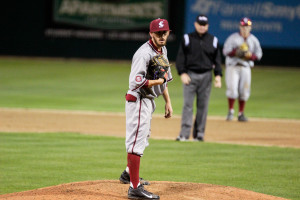Fansmanship Podcast Episode 217 – Chris Sylvester and Brint Wahlberg
It’s another podcast episode! Cal Poly basketball teams are at the Big...

Kevin George, while super effective, wasn’t throwing that hard on Tuesday. It got me wondering what will factor into batters having to stay in the box after being pegged. By Owen Main
Cal Poly baseball continued its slow start to the season yesterday, losing to Santa Clara 3-0 at home. The Mustangs had just one hit through eight innings and didn’t commit an error, though passed balls contributed to at least a few of the Broncos’ runs.
The Mustangs’ record fell to 2-7 on the young season. Santa Clara’s left-handed starting pitcher, Kevin George, kept the Mustangs off-balance all night. Cal Poly still hasn’t had a mistake-free defensive game (technically Tuesday night marked their first errorless game, but two passed balls tell a different story). They lost because, right now, that’s what they’re doing.
You can tell in their body language. You can tell in what you hear (or don’t hear) out of their dugout. Contrast it with the three other teams that have come into Baggett this year, and the Mustangs are aching for some swagger.
When things are going bad, sometimes they go bad in lots of ways.
On Tuesday night, two batters were hit by pitches and both times, they were told to get back in the batters box.
New rules say, according to stevetheump.com, that
“Starting in 2015, a batter must make an attempt to avoid being hit by the ball. If the umpire rules the batter did not make an attempt to get out of the way, or that he leaned into the path of the ball of the ball or intentionally tried to be hit by the ball, a pitch inside the strike zone that touches the batter will be called a strike. If the pitch is outside the strike zone, it will be called a ball. In either case, the batter will not be awarded first base.”
The first instance was less-obvious. A Cal Poly batter felt he was nicked by an offering from George, flipped his bat, and started trotting to first. The home plate umpire thought otherwise and, after conferring with the two other umpires, brought the hitter back to the box, where he was promptly retired.
The next inning, a Cal Poly hitter was again at the plate. This time, there was no doubt about the ball hitting the player flush in (I think) the side of the thigh. Once again, the Cal Poly batter started toward first base, and once again, the umpire called him back.
George was not a particularly hard-thrower from the left side. Perhaps the pitch selection and the speed of the pitches plays some role in the umpire’s decision to award first base? I honestly have no idea, but maybe an umpire is more apt to not grant first-base to a player pegged by a curve ball? In that case, I guess a pitcher might just need to put some spin on the ball, make it close, and feel that they have a chance to hit a batter and have it be simply called a ball.
As this year goes on, I know I’ll be paying attention to off-speed pitches inside, whether there are more than usual, and whether they hit more guys than I saw last year.
As usual, I’ll probably also be too busy (lazy) to look up or try to mine any data about it, but I think someone who was much more intrepid than me might be able to make a good point if they did.
This is probably my favorite theory about why Cal Poly didn’t get first base on either of those plays — because that’s just how things are going right now for this team. Frustrated players might choose to get/stay frustrated over a play or two here and there. If you think a team in any sport doesn’t affect how the sport is called with their aggression and the way they play, you’re wrong.
A team that’s winning games and putting up good at-bats probably shakes situations like that off and overcomes them. Guys on a struggling baseball team may try to do too much, get really frustrated, and continue some kind of cycle of poor play. If you’re going by the “body language” test, these guys need to get some baggage off their collective backs.
Maybe playing a worse team in Pacific (0-11) will be a good thing for Cal Poly. Fans at Baggett sure hope so, because on Tuesday night, the loudest Krukow’s Klubhouse could get was heckling the opposition’s third-baseman. He didn’t have a hit, but he did get on-base with a walk in the game.
Getting on-base was something only four Mustangs did all night on Tuesday.
It’s another podcast episode! Cal Poly basketball teams are at the Big...
One of my favorite authors, Jeff Pearlman joins this edition of the...
Donovan Fields is one of the most joyous basketball players I’ve ever...
With the tournament more than underway and the sweet sixteen fast approaching,...
(Article by Luke “Loco” Johnson. Forgive website faux pas.) The genius of...
* Team Records accurate as of Friday morning, 8:39 A.M. The hyped hoopla...
